|
|
|
Sort Order |
|
|
|
Items / Page
|
|
|
|
|
|
|
| Srl | Item |
| 1 |
ID:
141211
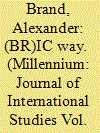

|
|
|
|
|
| Summary/Abstract |
This review article assesses two books against the background of the question of whether China and India as emerging economies provide a development ‘alternative’. The double meaning of this refers to, first, their own experience of recent rapid growth and the chances of replicating this development elsewhere. Second, it points to the external development assistance policies of the BRICs towards the global South and their impact on development thinking and practice.
|
|
|
|
|
|
|
|
|
|
|
|
|
|
|
|
| 2 |
ID:
155137


|
|
|
|
|
| Summary/Abstract |
Treating the threat of climate change in the Caribbean as a case study instructive for responses globally, this article examines the social and political relations of climate change. It argues for an analysis taking into account the ways in which the histories of imperialism and colonialism have shaped contemporary global ‘development’ pathways. The article charts how Caribbean vulnerability to temperature rises of more than 1.5°C of warming comprise an existential threat structured by contemporary social relations that are imperialist in character. Hope can be taken from a politics of climate justice which acknowledges the climate debts owed to the region.
|
|
|
|
|
|
|
|
|
|
|
|
|
|
|
|
| 3 |
ID:
186160
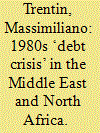

|
|
|
|
|
| Summary/Abstract |
The article reviews the positions and policies of Middle Eastern and North African states towards the external ‘debt crisis’ of the 1980s within the context of contemporary debates and negotiations held at regional and international levels. MENA countries shared many commonalities with their developing partners across the postcolonial world and participated actively in the debates within multilateral organizations, such as the United Nations Conference on Trade and Development (UNCTAD). Because standard borrowing in the MENA was public, bilateral and closely tied to politics, the article argues for the relevance of regional factors in shaping the course of the debt crisis in the MENA region, and challenges the common visions for which Western creditors could manage external debt as an effective ‘lever’ for introducing neoliberal policies: oil endowment, armed conflicts and alliances shaped the timing and results of the debt crisis in the MENA. The research is based on an extensive review of regional and international literature coupled with documents and proceedings from the UN organizations.
|
|
|
|
|
|
|
|
|
|
|
|
|
|
|
|
| 4 |
ID:
099108
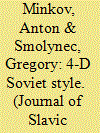

|
|
|
|
|
| Publication |
2010.
|
| Summary/Abstract |
Part two of the authors' study of the Soviet involvement in Afghnistan deals with social development as one of the elements of the overall Soviet state-building strategy. The authors conclude that Soviet social development policies, the effects of Soviet inspired nationalities policy, and the heavy-handed response to the opponents of the Peoples Democratic Party of Afghanistan (PDPA) alienated much of the population. The government in Kabul was able to attract some support primarily among the urban and the more educated stratum of the society, but, on the whole, remained isolated from the rural masses. The inability to engage a significant number of people in the state building process seriously undermined the Sovietization strategy. Soviet efforts to raise literacy levels among Afghans, and to enfranchise Afghan women could be qualified as relatively, if ephemerally, successful.
|
|
|
|
|
|
|
|
|
|
|
|
|
|
|
|
| 5 |
ID:
101055
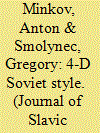

|
|
|
|
|
| Publication |
2010.
|
| Summary/Abstract |
4-D Soviet Style
Defence
Development
Afghanistan
Soviet Period
Economic Development
Russia
|
|
|
|
|
|
|
|
|
|
|
|
|
|
|
|
| 6 |
ID:
133883


|
|
|
|
|
| Publication |
2014.
|
| Summary/Abstract |
Access to public health care has often been equated with health outcomes. Outcomes-based analysis often misunderstands the process of access to health. This article conceives access to health as a bundled concept and decomposes access into availability, affordability and acceptability. Access to health is determined by public provisioning as well as by socio-economic characteristics of households. It attempts to examine these dimensions across different regions of the Indian state of Uttar Pradesh (UP). It shows that there are variations across regions and socio-economic characteristics of households. A particular group from one region may not have the same degree of access as its counterpart in another region and at the same time there are variations across groups in the same region. The scale of development of regions also plays an important role in promoting or hindering access to health.
|
|
|
|
|
|
|
|
|
|
|
|
|
|
|
|
| 7 |
ID:
146697
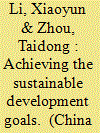

|
|
|
|
|
| Summary/Abstract |
Development became a G20 priority under the Korean presidency in 2010 and has remained central to global summitry ever since. Although the G20 has formally involved itself in the post-2015 process following the St. Petersburg Summit in 2013 and emphasized the Sustainable Development Goals (SDGs) as a core priority under Turkey's presidency in 2015, the UN remains the main channel for global negotiations and discussions of the post-2015 development agenda up to its approval and adoption in September 2015 and will continue to play the leading role in the follow-up implementation and tracking of SDGs. The present paper argues that as the SDGs come to dominate the agenda and action of donors and issues of financing take central stage, the G20 can play an important role in facilitating the implementation of the SDGs due to its various strengths, although it also faces serious challenges. The paper also points out that as the 2016 G20 chair, China can make great contributions in advancing the implementation of the SDGs both domestically and internationally.
|
|
|
|
|
|
|
|
|
|
|
|
|
|
|
|
| 8 |
ID:
083435


|
|
|
|
|
| Publication |
2008.
|
| Summary/Abstract |
The transformation of Saharan populations into an object of global security is analysed as a specific instance of security's expansion globally, as well as of its merger with development, understood as a side-effect of the former. It is shown that the search for threats in the Sahara, and the establishment of surveillance apparatuses, is a precondition for the detection and discursive production of these threats. Security, through its production of knowledge, manages to objectify what had hitherto constituted a borderland of knowledge and government. The securitization of the Sahara and its populations creates a field of intervention for diverse agents of security and development. However, it does so not as part of a coherent global regime of control, but on its own specific and random terms, within a political economy of danger that is the product of discursive and material struggles. The securitization of the Sahara, it is argued, should be seen as actually existing security - that is, a complex of security practices serving diverse interests, with contradictory and open-ended outcomes
|
|
|
|
|
|
|
|
|
|
|
|
|
|
|
|
| 9 |
ID:
141776
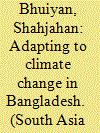

|
|
|
|
|
| Summary/Abstract |
Climate change poses a serious threat to humanity in developed and developing countries and is already affecting South Asia. This study examines the role that good governance plays for adapting to climate change in Bangladesh, arguing that lack of good governance in Bangladesh risks reducing adaptation preparedness to climate change in the country. There is evidence, mainly because of geophysical risk factors, to support arguments that good governance has anyway limited capacity in relation to adaptation measures to climate change in countries like Bangladesh. The article argues that the current politico-economic situation makes it doubtful whether Bangladesh will achieve the fullest possible ability to ensure good governance for better adaptation to climate change in the near future.
|
|
|
|
|
|
|
|
|
|
|
|
|
|
|
|
| 10 |
ID:
130865
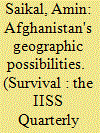

|
|
|
|
|
| Publication |
2014.
|
| Summary/Abstract |
Afghanistan's geostrategic potential is hampered by domestic weakness, regional tensions and major-power competition. Historically, Afghanistan's position at the junction between Asia and Europe has not only made it susceptible to outside invasions and influence, but also rendered it an important conduit for cross-continental interactions. The Greco-Bactrian (250-150 BCE), Kushan (30-375 AD) and Sassanid (224-651 AD) empires derived much of their wealth from the Silk Road, a series of interlinked trading networks criss-crossing the Eurasian land mass and centred around what is now known as Afghanistan. These routes served as the main arteries of east-west trade and transportation, until the disintegration of the Mongol Empire in 1368 AD effectively dismantled the network.
|
|
|
|
|
|
|
|
|
|
|
|
|
|
|
|
| 11 |
ID:
122012
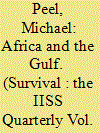

|
|
|
|
|
| Publication |
2013.
|
| Summary/Abstract |
Gulf states and sub-Saharan African countries have begun to forge closer economic ties over the past few years. This process, amid financial crisis in the West and strong growth in Africa, provides a platform for an important new inter-regional geopolitical power play.
|
|
|
|
|
|
|
|
|
|
|
|
|
|
|
|
| 12 |
ID:
141877
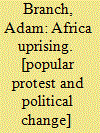

|
|
|
|
|
| Publication |
London, Zed Books, 2015.
|
| Description |
xi, 251p.hbk
|
| Contents |
(B)
|
| Standard Number |
9781780329987
|
|
|
|
|
|
|
|
|
|
|
|
Copies: C:1/I:0,R:0,Q:0
Circulation
| Accession# | Call# | Current Location | Status | Policy | Location |
| 058379 | 960/BRA 058379 | Main | On Shelf | General | |
|
|
|
|
| 13 |
ID:
122011


|
|
|
|
|
| Publication |
2013.
|
| Summary/Abstract |
Africa is booming. Of that, there is little doubt. One feels it every time one lands in Lagos, Addis Ababa, Nairobi or Accra. Hotels are filled to the brim and business-class seats are sometimes hard to come by. Companies are struggling to fill executive positions because they are growing so rapidly. The energy on the streets is palpable, and the rest of the world is noticing. A recent issue of the Economist, for example, led with an article on 'Aspiring Africa' and included an advertisement for an Africa-focused conference in Dubai.1 This followed the first The Times CEO Summit Africa, held in Geneva earlier this year, and the first New York Forum Africa, which took place in Gabon in 2012 and brought over 500 global business leaders to the tiny West African nation. Events such as the IISS forum 'The Geo-economics of Resources and Conflict in Africa', held in Bahrain in April, also show that the world's perception of Africa is changing.
|
|
|
|
|
|
|
|
|
|
|
|
|
|
|
|
| 14 |
ID:
110108
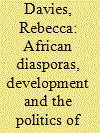

|
|
|
|
|
| Publication |
2012.
|
| Summary/Abstract |
This article seeks to add to the debate on the role of diasporas in development outcomes in sub-Saharan Africa by considering why diasporas are not apparently as effective as development agents in an African setting as they have proven thus far in other regions. It argues that changing diasporic engagement and activities on the continent should be examined against the backdrop of the emergence of a 'liberalisation from below' which emphasises local ownership of development outcomes, the historical variety of African state forms and the continuities in the exercise of power and the nature of these states. In so doing, it brings into focus the ongoing transformation in state-society relations whereby the dependence-of elites and ordinary citizens alike-on external resources continues to deepen, and the importance of this context in drawing any conclusions about the role of diasporas as agents of transformation.
|
|
|
|
|
|
|
|
|
|
|
|
|
|
|
|
| 15 |
ID:
123456
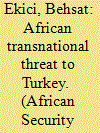

|
|
|
|
|
| Publication |
2013.
|
| Summary/Abstract |
Africa has emerged as a strategic location for transcontinental narcotics trade. Particularly the West African subcontinent has turned into a cocaine warehousing and trans-shipment hub along the way to the European underground markets. At this juncture, African drug networks (ADNs) began to play a momentous role in global drug trade, and pose a considerable threat to international security, as they operate in more than 80 countries. The United Nations Office on Drugs and Crime, Interpol, and Europol perceive ADNs as one of the primary issues in international counter-narcotics policy. These agencies have launched several multilateral initiatives to contain the West African threat. None of these initiatives, however, retarded the expansion of the problem. Indeed, the containment efforts turned out to be quite embryonic. The ADNs eventually entered the Turkish market by the early 2000s. West African drug networks (WADNs) in particular have begun to operate within Turkey extensively, often supplying and distributing drugs. The gravity of the threat became ever more serious by 2012. The upsurge of the new threat has compelled the Turkish drug-law enforcement agencies to adopt new policies and counter-strategies. These policies have to be based upon proper strategic analysis of the threat. This paper seeks to address the need for a threat assessment of ADNs. It investigates the dimensions of the problem, profiles the members of WADNs, their modes of operation, and the factors that compelled them to exploit the illicit Turkish drug markets. The analyses are based upon the scrutiny of 227 narcotic interdictions files and statements from the African individuals in these case files. The paper concludes by presenting policy implications and recommendations for the Turkish security and foreign-policy institutions to cope with this impending threat.
|
|
|
|
|
|
|
|
|
|
|
|
|
|
|
|
| 16 |
ID:
087441
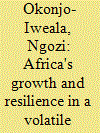

|
|
|
|
|
| Publication |
2009.
|
| Summary/Abstract |
Untill 2008, thanks to domestic policy reforms, external assistance and high commodity prices, most of the economies of sub-Saharan Africa experienced sustained and accelerating growth for over a decade. Poverty was declining, health and education indicators were improving- albeit from a low base and there were sighs that Africa's HIV/AIDS prevalence rate had begun to decline.
|
|
|
|
|
|
|
|
|
|
|
|
|
|
|
|
| 17 |
ID:
130866


|
|
|
|
|
| Publication |
2014.
|
| Summary/Abstract |
Curbing corruption is vital for China's future. But the exposure of corruption cases can only damage public confidence in the CCP and the state more generally. Corruption associated with toxic food, bogus medicines, grave abuses of power and criminal 'black societies' has produced a series of public scandals in China. Without reform, further occurrences could rapidly erode the legitimacy not just of the police and other judicial organs, but also of the ruling Chinese Communist Party (CCP). The recent trial of Bo Xilai, the former Chongqing party secretary and member of the party's elite 25-member Politburo, showcased the kind of corruption that China's past president Hu Jintao warned could lead to 'the collapse of the Party and the downfall of the state'. In 2011, the Bank of China inadvertently reported that between 1994-2008 as many as 18,000 corrupt officials had fled the country for destinations in Europe, America and other parts of Asia, plundering an estimated $120 billion from state-owned enterprises and other criminal activities. The costs of maintaining domestic public order have also grown rapidly, and, for the first time, domestic security outlays approved by the 2012 National People's Congress (NPC) exceeded defence, in part over concerns about the growth of mass protests, fraud, corruption and organised crime, and the need to strengthen weiwen (stability) and social harmony.
|
|
|
|
|
|
|
|
|
|
|
|
|
|
|
|
| 18 |
ID:
164396
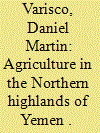

|
|
|
|
|
| Summary/Abstract |
The most fertile part of the Arabian Peninsula is the southwestern corner known historically as Yemen. The primary occupation of Yemen’s tribes over the centuries has been sedentary agriculture, stemming back to the pre-Islamic South Arabian kingdoms. Up until the revolution that toppled the Zaydī imamate in 1962, agricultural activities had change little over the centuries. After the revolution and civil war in the north, development aid poured into Yemen and access became available to modern machinery, especially diesel pumps for wells, and supplies. This article analyzes the transition from a household subsistence-based production to cash cropping in the northern highlands of Yemen. The focus is on the regions north and east of the capital Ṣanʿāʾ, which received less aid than the coastal region and southern highlands. Details are provided on the methods and production of agricultural crops in the period between 1975 and 1985, with an assessment of the potential future development of agriculture in a country currently torn apart by war.
|
|
|
|
|
|
|
|
|
|
|
|
|
|
|
|
| 19 |
ID:
131354
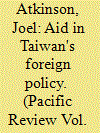

|
|
|
|
|
| Publication |
2014.
|
| Summary/Abstract |
Taiwan's foreign aid policy is largely a response to its China-imposed international isolation. Taiwan provides aid without stringent accountability conditions to countries in Africa, the Americas, and the South Pacific in order to maintain official diplomatic relations in the face of Chinese opposition. Often at odds with this is Taiwan's interest in seeking western support through being seen as a responsible aid donor. Domestic political constraints on Taiwan's aid budget accentuate the tension between these two interests. Taiwan's aid program can be seen as the product of these three competing and enduring pressures - maintaining the count of official diplomatic relationships, improving its international reputation, and containing aid spending.
Taiwan President Ma Ying-jeou's tacit 'diplomatic truce' with China - part of a wider warming of intergovernmental relations across the Taiwan Strait - has reduced significantly the squeeze between these three pressures on Taiwan's foreign aid policy. It has allowed the Ma administration to improve Taiwan's reputation, while maintaining or even reducing its aid expenditure, and still retain the same number of official diplomatic relationships. Nevertheless, the Ma administration has not wanted to alienate recipient governments while the prospects for the diplomatic truce with China remain uncertain. There remains considerable continuity with past practices, and the government's handling of aid as a foreign policy tool is still largely opaque and unaccountable.
|
|
|
|
|
|
|
|
|
|
|
|
|
|
|
|
| 20 |
ID:
127968
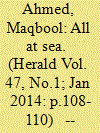

|
|
|
|
|
|
|
|